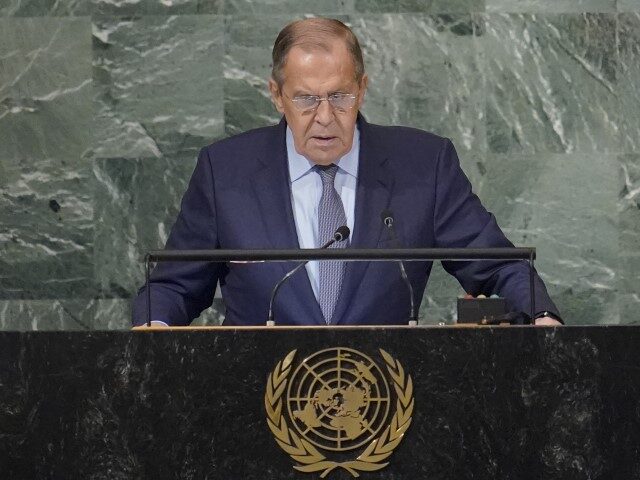Russian Foreign Minister Sergey Lavrov unleashed a torrent of invective against the American “hegemon” and the free world generally during his address to the United Nations General Assembly on Saturday, reiterating his accusations of “Nazi” sympathies against the Ukrainian government and condemning “grotesque” “Russophobia.”
Lavrov spoke in the aftermath of his boss, Vladimir Putin, announcing last week a conscription plan to feed into Russian troops currently fighting in Ukraine – a move many interpreted as a sign that Moscow had suffered enough losses in Ukraine to require a significant military buildup to recover.
Putin invaded Ukraine in 2014, colonizing its Crimean peninsula and fueling the ongoing war in the eastern Donbass region. The eight-year-old conflict has become arguably the most mentioned topic at this year’s General Assembly as Putin announced a “special operation” in February to oust the Ukrainian government and recognize the Donbas’s Donetsk and Luhansk regions as countries.
As Putin did last week, Lavrov claimed that Ukraine’s Western allies, including America, were not simply seeking to take sides in the war but to eradicate Russian identity from the planet.
“The official Russophobia in the West is unprecedented now. The scope is grotesque,” Lavrov said. “They’re not shying away from declaring the intent to inflict a military defeat on our country but also to destroy and fracture Russia. In other words, what they want to do is remove from the global map a geopolitical entity that has become all too independent.”
Russia, the top diplomat continued, was fighting a war to save the planet from a future in which America’s moral and political values stood paramount.
“The future of the world order is being decided today and it is clear to any impartial objective [sic – as per U.N. translator],” Lavrov said. “The question is whether or not that we need a kind of order with one hegemon ahead of it, making everyone else living following his notorious rules of benefit to the hegemon only, or we’re going to have a democratic, fair world without blackmail and without … neo-Nazism and neo-colonialism.”
“We made a firm choice for the latter,” he declared.
Lavrov went on to accuse Washington of wanting “to stop the march of history” by deterring the malign influence of rogue states such as Russia.
“At some point in the past, declaring that they were victorious in the Cold War, Washington erected themselves into an almost envoy of God on Earth without any obligations but only the sacred right to act with impunity,” the foreign minister said, “to act whenever and wherever they want, and this can be done anywhere against any state – especially if they’ve somehow displeased the self-proclaimed masters of the world.”
Lavrov then went into an extensive harangue on the Iraq war and American “adventurism,” requesting of his audience, “name a country where Washington interfered by force and, as a result of that, life improved.”
About Ukraine, Lavrov repeated the talking point that the 2014 uprising against pro-Russian former President Viktor Yanukovych was a “bloody coup” and not a popular revolt – the claim Russia uses to make the case that current Ukrainian President Volodymyr Zelensky is not legitimate. Zelensky played no political role in the events of 2014; he was starring in the Ukrainian television series Love in Vegas at the time. Yanukovych was replaced by the stridently anti-Russian President Petro Poroshenko in 2014 – the candidate Zelensky defeated in the 2019 election.
“We were expected to acquiesce in the Kyiv intent to ban the Russian language, education, our mass media and culture,” Lavrov proclaimed, “their insistence on chasing the Russians out of Crimea, on waging war against Donbass.”
While Lavrov dedicated most of his remarks to what he described as a global attempt to eradicate the Russian nation, he deviated on two occasions: to condemn America’s sovereign decision not to engage in business with its proxy state Cuba, and to call for India and Brazil to be given permanent seats on the U.N. Security Council.

COMMENTS
Please let us know if you're having issues with commenting.